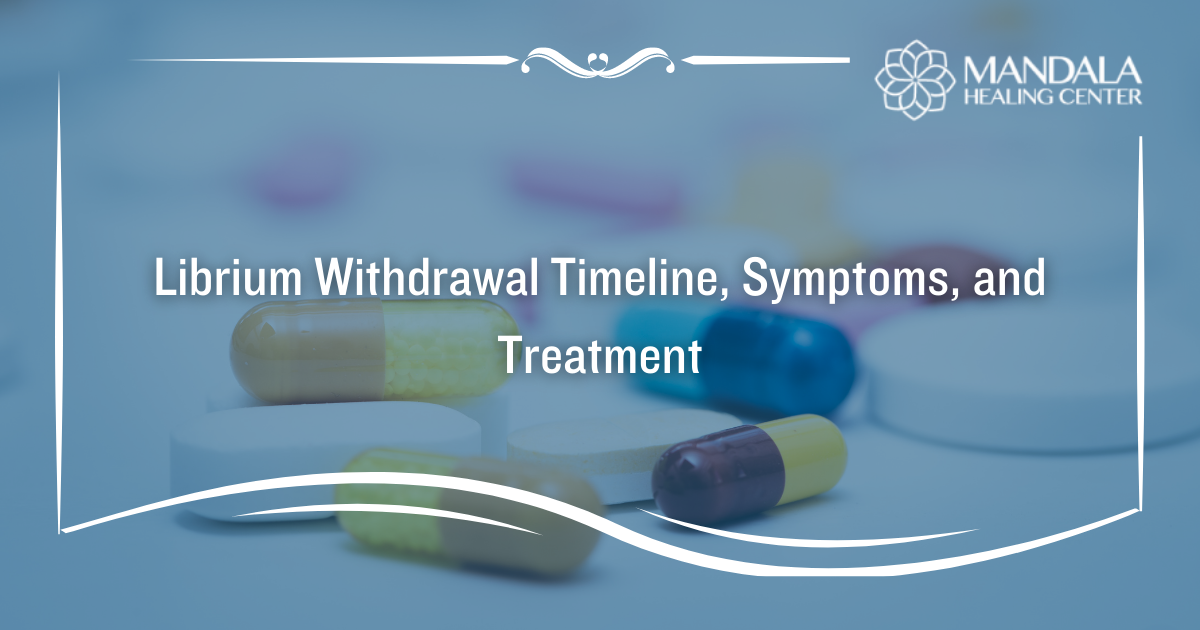Librium (chlordiazepoxide) is a benzodiazepine medication that has tranquilizing effects and is sometimes prescribed to treat acute anxiety, panic, sleep disorders, and alcohol withdrawal syndrome. The medication works by depressing the central nervous system and producing feelings of calmness and anxiety relief.[1]
Like other benzodiazepines, Librium enhances gamma-aminobutyric acid (GABA), a neurotransmitter that helps regulate the central nervous system. Due to the tranquilizing effects it produces, the body’s nervous system has to work harder to sustain natural functions. People who are physically dependent on benzodiazepines like Librium will experience symptoms of withdrawal when they stop taking the medication suddenly because the nervous system will continue to be overactive, but it won’t have benzo in the system to calm it down. This overactivity of the central nervous system causes symptoms like rebound anxiety, irritation, and insomnia.
Abruptly stopping Librium after regular use is generally not recommended due to the painful and sometimes life-threatening withdrawal symptoms that occur. People who have been taking Librium with a doctor’s prescription can work with their prescriber to slowly taper off the medication, but if someone is struggling with an addiction to Librium, they may be better off at an addiction detox center.
Symptoms of Librium Withdrawal
Symptoms of withdrawal can range from mild to moderate or severe. The severity of benzodiazepine withdrawal is mostly dependent on how long a person has been addicted to the substance they are detoxing from. The longer people take Librium and the higher the dose they take, the more severe they can expect the symptoms to be.
Common withdrawal symptoms include:[2]
- Anxiety
- Agitation
- Irritability
- Insomnia
- Sleep disturbances
- Drug cravings
- Nausea
- Vomiting
- Sweating
- Restlessness
- Depression
- Increased heart rate
- High blood pressure
- Lack of appetite
- Stomach ache
- Memory loss
- Seizures
- Hallucinations
- Psychosis
- Tremors
- Suicidal ideation
Because of potentially life-threatening symptoms like psychosis, seizures, and suicidal ideation, it is always best to detox under close medical supervision.
Rebound Withdrawal Symptoms
Benzodiazepine withdrawal is often characterized by “rebound withdrawal” symptoms or the “rebound effect.”[2] This refers to the re-emergence of prior symptoms that were being treated with Librium. For example, many people take Librium for anxiety and insomnia. These symptoms are likely to return and be even more serious when a person is detoxing.
How Long Does Librium Withdrawal Last?
There are many factors that influence the duration of the Librium withdrawal timeline, for instance:
- Higher doses are associated with longer withdrawal periods
- The longer and more frequent a person abuses benzos, the longer it will take to detox from them
- Health factors like liver health, metabolism, age, and body weight can impact the duration of withdrawal
- Polydrug abuse can cause substances to leave the body at a slower rate, extending the withdrawal timeline
Older individuals typically experience longer withdrawal timelines than younger people. At the same time, the duration of withdrawal is greatly influenced by whether a person last used short-acting Librium or extended-release Librium.
In most cases, symptoms of withdrawal will begin in the first 24 hours after the last dose. Symptoms usually last 2-3 weeks, but some post-acute withdrawal symptoms (PAWS) can last for several months or years.
Librium Withdrawal Timeline
While there are many variables affecting the duration of withdrawal, an approximate Librium withdrawal timeline is:
- 24 hours after the last dose – Symptoms like restlessness, anxiety, sweating, and loss of appetite will begin and get more severe as time goes on.
- 1 week after the last dose – Symptoms will continue to worsen and gastrointestinal upset may set in. Other symptoms like tremors, irritability, and agitation may also occur.
- Weeks 2 – 3 – Withdrawal symptoms usually peak sometime between weeks two and three. Severe symptoms like psychosis and seizures are possible.
- Weeks 4 – 6 – Symptoms will subside and become less severe as time goes on. Any symptoms that persist beyond this time frame are considered part of PAWS and can be managed with the help of lifestyle changes or a substance abuse treatment program.
Librium Detox Treatment
People who are taking Librium should only stop taking the medication if their doctor advises them to do so. Then, the doctor can create a tapering schedule that slowly reduces the dose of the drug over time to avoid severe withdrawal symptoms.[1]
During the tapering process, doctors may switch the medication from Librium to Valium because Valium has a longer half-life and can be more effective at managing symptoms of withdrawal. Other non-benzodiazepine medications may also be used during withdrawal to manage any remaining symptoms. Detox medications include:
- Clonidine
- Propranolol
- Vistaril
- Melatonin
- Eszopiclone (Lunesta)
At a drug and alcohol detox center, patients can detox under close medical supervision. Nurses can monitor symptoms 24 hours a day to prevent any complications or emergencies from occurring. This is the safest, most effective way to detox people who are struggling with a substance use disorder.
Find Help for Librium Abuse and Addiction Today
Receiving intensive treatment at a residential treatment center in West Palm Beach can provide those struggling with Librium addiction with a safe, supportive environment for recovery. Mandala Healing Center’s upscale drug and alcohol detox facility offers medically-assisted detox to help withdrawal remain safe and manageable, increasing the patient’s chances of staying sober.
If you or a loved one are struggling with addiction and ready to begin your recovery, please call us today. Our team of qualified admissions coordinators is always ready to help.
References:












